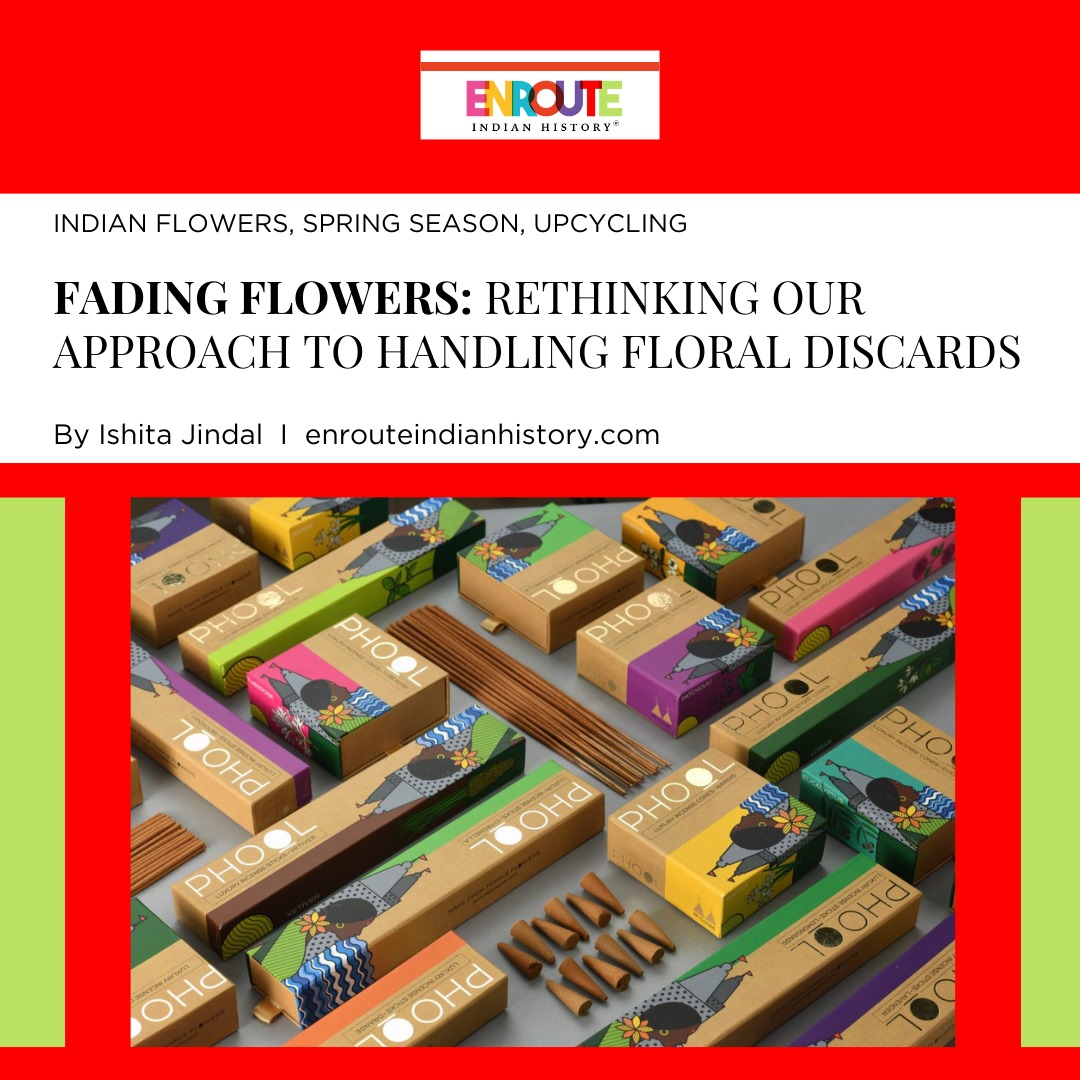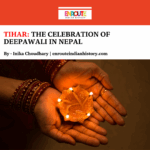
Introduction
Flowers are used for beautification and decoration and among all the purposes flowers are widely used for worship at home and in temples. Flowers are the most beautiful natural resource on earth. Mainly in Hindu worship, puja is incomplete without offering vibrant, colourful flowers to God. The rituals of offering flowers in temples show love and devotion to God. Once they have served their purpose, flowers, leaves from various plants, and coconuts are thrown into water bodies or left out in the open as floral trash. Finding the alternative to “Asian Jal-Pravah” method, efforts are being made through various initiatives to address and mitigate this environmental concern.
According to Hindu Mythology, flowers play a significant role in the worship of different Gods and goddesses. Different varieties of flowers are used for different deities. Jasmine, Palash, Red Hibiscus, Marigold, Lotus, and Dhatura are widely used flowers (Bhati et al., 2021). The fragrance of the colourful flowers generates a positive vibe and helps to create a festive ambiance, ideal for prayer and worship. The growing concern is the fact that flowers offered to the deities are leading to waste generation and it is thrown away from the exit portion of the temple and is mixed in the water bodies. There is irrevocable damage done to the river water due to the mixture of all the pesticides used in flower growing.
Famous temples that are at the top list of flower waste generation includes Kashi Vishwanath, Madurai Temple, Puri Jagannath Temple, and Omkareshwar Temple. About 8 million tonnes of flower waste is dumped into the rivers, creating environmental degradation (Adhikary and Vishwavidyalaya, 2020). Reimagining the preservation of river biodiversity and ecosystem, numerous initiatives are underway to transform floral waste into practical and eco-friendly products. Ranging from organic incense sticks to sustainable clothing, these efforts signify a pivotal shift towards tackling environmental issues while simultaneously fostering employment prospects for local communities.
Phool.co
This organisation collects flowers from different temples and upcycle the collected flower wastes into recycled high margin products like flower sticks, fragrant soap and vegan leather. More than 300 women are engaged to deliver certified wellness, beauty and fragrance products. The idea of such an initiative came in 2015 and it started its journey in 2017 with the objective of turning temple-flower waste into biodegradable products. Phool also provides compostable packages that are derived from vegetable dyes and Tulsi seeds impregnated in seed paper. Users can use flowers or incense to nurture Tulsi plants. Consumers who scan a QR code on the package can upload images and get discounts.

Fig: Phool Incense Sticks and Cones
(Source: https://phool.co/)
Project Polaash
Started in 2019, Project Polaash collaborates with the temples of Delhi to handle the proper management of floral waste. The workers associated with this project daily collect approx 400 kgs of flowers from the temples of Delhi and then it is transferred to the production centre to create organic dyes. The T-shirts and Scarves manufactured under project Palaash are sold directly to the customers to promote sustainable fashion. Project Polaash is now planning to explore more possibilities of upcycling flower waste. This includes scented candles, incense sticks and essential oils. Under this project a total of 30,000 kg of chemical pollution has been reduced.

Source: Prakriti.in
Rupa Trivedi- Adiv Pure Nature
Rupa Trivedi, the founder of Adiv Pure Nature focuses on the natural organic dyes from the temple flowers. This organisation started the journey in 2008 with the concept of the temple dye project and temple textile business. This project was run by the collection of flowers from different temples in Mumbai (Mulay et al., 2020). Adiv Pure Nature works on luxurious and handmade textiles maintaining environmental sustainability. This brand works globally with the love and concern for the common people. Wasted Floral materials that are collected are dried for a specific time and then it is converted into powder form. Marigold, hibiscus and rose flowers are mainly collected as waste from the temples. This brand focuses on the objective of reducing waste and reusing and recycling waste items.

Fig: Adiv Pure Nature
(Source: https://www.surfacemag.com/articles/international-folk-art-market-2019/)
Angelique Foundation
Jhandewalan temple in Delhi has installed a new composting machine for the reuse and recycle purpose of temple-based flowers. With the introduction of a new composting machine this temple management system converts floral offerings into manure form. The extra flowers that haven’t been converted into the process are sent into the Gaushala. Those floral wastes are mixed with cow dung to prepare manure. The process mirrors that of a circular economy, wherein the flower originates from the soil, undergoes decomposition, and subsequently returns to the soil. Every day approx 50 kg of compost is produced through this process.
Kalla: Begin with Flowers, Preserving the faith
Kalla is a brand located in Surat that converts temple-flower waste products into incense sticks, essential oils, bathing bars and fragrant candles. All products are made without using any chemicals and along with the environment, they don’t harm even our health. Under this initiative, 2.5 lakh kilos of floral waste has been upcycled. Kalla also ran a campaign on different social media platforms for using this brand’s natural products like organic gulaal for Holi.

(Source: https://www.facebook.com/beginwithflowers.surat/)
Bageeya Eco Clothing
Bageeya is a popular clothing brand for its sustainable and eco-friendly products. This brand manufactures natural, handmade cotton, silk, and linen fabric products. This brand focuses on natural products prepared from drying temple flowers. First, the flowers are converted into powder and then further processed with natural dye and plant-based extract. These eco-friendly products are free from harmful chemicals, plastic and are sustainable and reasonable.

(Source: https://brownliving.in/cdn/shop/collections/bageeya-835237.jpg?v=1682959686)
The issue of water pollution caused by the disposal of floral waste into water systems, particularly from various temples, has posed a significant environmental challenge. However, there has been a notable shift in the narrative, thanks to the increasing awareness among the public and voluntary organisations. Through these efforts, a more holistic approach is being taken to mitigate environmental degradation while promoting the creation of eco-friendly products and employment opportunities for local communities.
References
Adhikary, K. and Vishwavidyalaya, M., (2020). Management of Temple Floral Waste and Utilization of Value Added Floral Waste Product: A Review. International Journal for Environmental Rehabilitation and Conservation, 11, pp.120-128.
Atal, H.L., (2022). Sustainable Management of Floral Waste to Produce Bioenergy and Valuable Products. Journal of Indian Association for Environmental Management (JIAEM), 42(2), pp.26-34.
Bhati, M.I., Dubey, R.K. and Singh, S., (2021). Review on approaches to floral waste management for sustainable environment. Climate Change and Environmental Sustainability, 9(2), pp.110-116.
Choudhury, N.P. and Deka, P.,(2024). Blooms beyond beauty: Commercializing floral waste for a sustainable city.
Devi, N.S., Vandna, Tagi, N. and Tabing, R., (2022). Flower waste management: a review.
Gupta, S., Tewari, S.K. and Pathak, S., (2023). Temple floral waste for various bio-products in India. In Recent Trends in Solid Waste Management (pp. 293-307). Elsevier.
Kumar, V., Kumari, S. and Kumar, P., (2020). Management and sustainable energy production using flower waste generated from temples. Environmental degradation: causes and remediation strategies, 1, p.154.
Mulay, Y., Owal, S., Chougule, P. and Pandit, A., (2020). Composting of floral waste by using indigenously isolated microbial consortium: an approach towards the Environment sustainability and waste management. Int J Environ Agric Res, 6(4), pp.20-26.
Ranjan, V.P. and Goel, S., (2022). Biodegradation of Floral Waste Under Aerobic Conditions with Different Microbial Inocula and Aeration Methods. In Treatment and Disposal of Solid and Hazardous Wastes (pp. 1-26). Cham: Springer International Publishing.
Sri Soundarya, S., Radhika, P., Srinivasa Reddy, D. and Supriya, K., (2021). An Analysis of Pattern of Floral Waste Generated and Disposal in Hyderabad City of Telangana State.



















